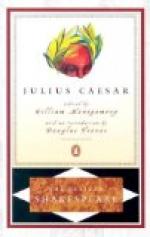|
|
Julius Caesar Act V, Scene I
A messenger approaches Octavius and Antony's camp announcing that Brutus and Cassius have arrived, flying their battle flag. Octavius understands Cassius and Brutus' move as an attempt to show their strength and bravado. Antony knows better, and realizes that Brutus and Cassius are trying to put on a show of being braver and more prepared than they really are. The two sides, before beginning to fight, approach each other to speak. Antony tries to provoke Brutus, and tells him that every single stroke that killed Caesar will be avenged on the battlefield:
Brutus: "Words before blows: is it so, countrymen?"
Octavius: "Not that we love words better, as you do."
Brutus: "Good words are better than bad strokes, Octavius."
Antony: "In your bad strokes, Brutus, you give good words; Witness the hole you made in Caesar's heart, crying, 'Long live! hail, Caesar!'" Act V, Scene I, Line 27
As Antony and Octavius exit, Cassius speaks a little with his officer Messala, and tells him of two eagles who yesterday were following his troops. Today the eagles are gone, and have been replaced by a legion of ravens and other scavenger birds. Cassius is worried by this sign. After Cassius tells Messala his worries, he approaches Brutus and gives a farewell. The two men discuss what they will do if they lose the battle; Brutus states that he will never be led through the streets of Rome as a captive, and so, this is either the last time the two shall ever meet, or they will see each other again and be able to smile. "No, Cassius, no: think not, thou noble Roman, that ever Brutus will go bound to Rome; he bears too great a mind. But this same day must end that work the ides of March begun; and whether we shall meet again I know not. Therefore our everlasting farewell take. For ever, and for ever, farewell, Cassius. If we do meet again, why, we shall smile; if not, why then this parting was well made." Act V, Scene I, Line 111 The two give solemn parting wishes, and exit.




